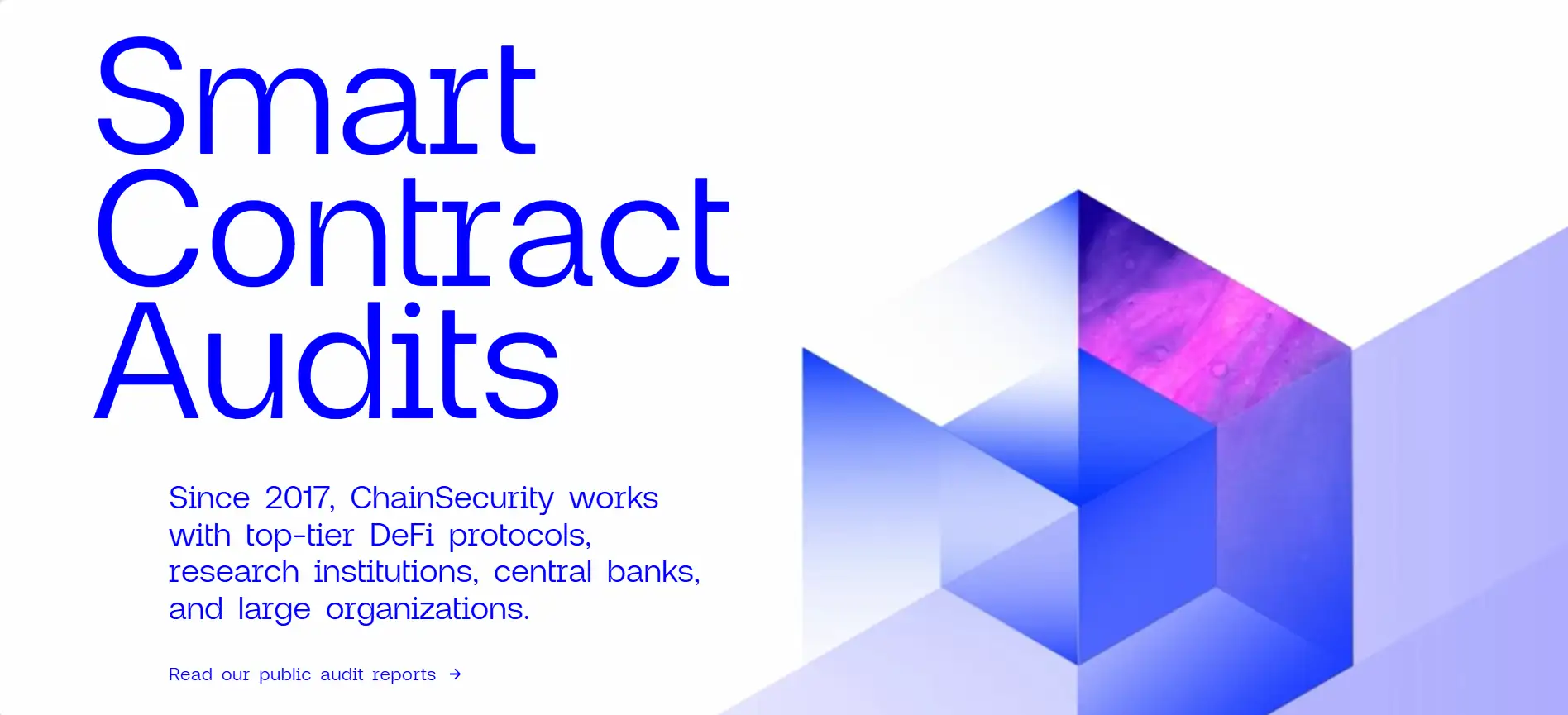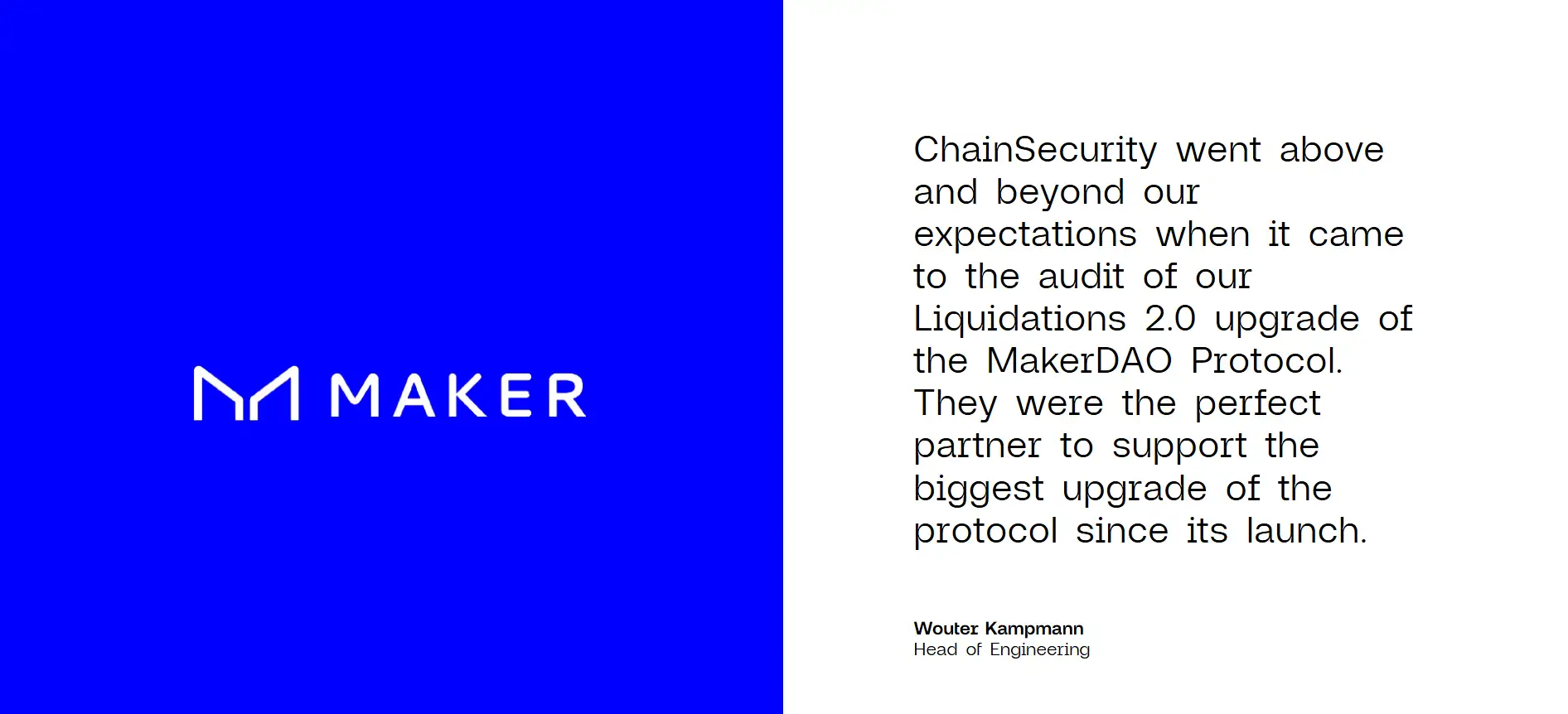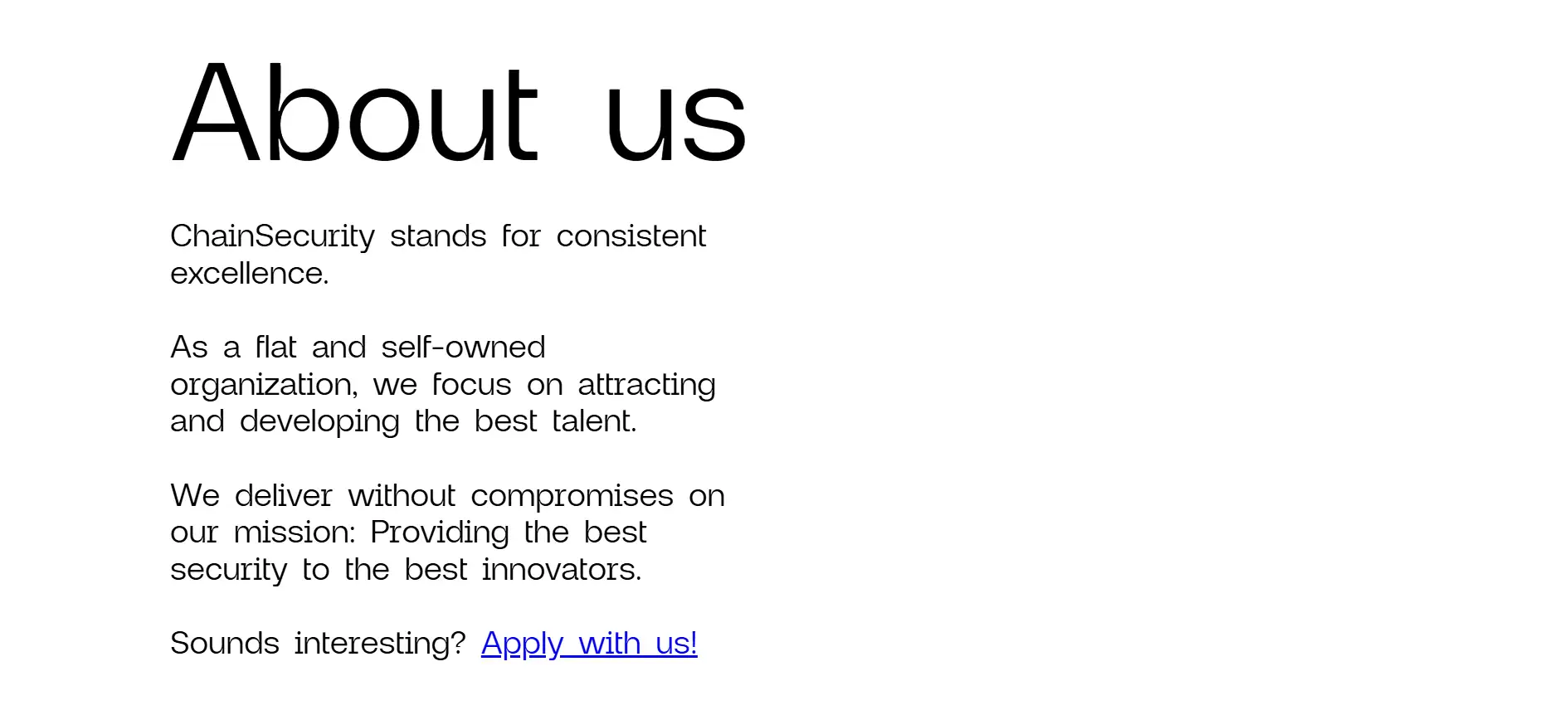About ChainSecurity
ChainSecurity is a premier provider of smart contract audit services, serving the most innovative DeFi protocols, central banks, and large-scale Web3 initiatives since 2017. With a commitment to uncompromising quality and technical precision, ChainSecurity has established itself as a trusted name among projects requiring critical code review and formal verification.
Operating as a self-owned, flat-structured organization headquartered in Zürich, Switzerland, ChainSecurity focuses exclusively on attracting top-tier talent in the fields of cryptography, formal methods, and blockchain development. The team collaborates with industry leaders like MakerDAO, Curve, and Enzyme to enhance protocol security and support responsible innovation. ChainSecurity audits are considered a benchmark in smart contract quality assurance.
ChainSecurity stands at the intersection of academic research, formal verification, and real-world protocol engineering. Since its founding, it has built a track record of trusted audit partnerships with major names in the blockchain space. These include in-depth audits of protocols like Compound III, MakerDAO’s Liquidations 2.0, Enzyme Sulu Extensions, Liquity V2, and Mellow Multivault. Each report not only identifies vulnerabilities but also delivers clear recommendations grounded in deep technical understanding.
What makes ChainSecurity especially unique is its rigorous methodology rooted in formal verification—a mathematical approach that ensures the correctness of code beyond traditional testing. This makes ChainSecurity the go-to auditor for protocols dealing with stablecoins, zero-knowledge proofs, restaking systems, and derivatives platforms. Whether it’s for high-volume DeFi applications or cutting-edge privacy protocols, ChainSecurity brings the same level of care and scrutiny.
As a research-oriented security firm, ChainSecurity also contributes to the broader blockchain community through blog posts, vulnerability disclosures, and ecosystem-wide education. Articles such as “Merkle Mountain Range: the case of Herodotus” and “TSTORE Low Gas Reentrancy” showcase the depth of technical engagement provided to the public. Their experts regularly explore Ethereum protocol changes like EIP-1153 and release tools and guidelines for developers.
ChainSecurity’s core competitors include firms like Trail of Bits, Consensys Diligence, Certik, and OpenZeppelin. Yet, what sets ChainSecurity apart is its precision-driven, academically grounded, and context-aware auditing approach that aligns perfectly with the evolving demands of Web3 infrastructure.
ChainSecurity provides a suite of expert-driven auditing and security features that make it a cornerstone in the Web3 ecosystem:
- Formal Verification: Unlike standard audits, ChainSecurity applies mathematical proofs to ensure contract behavior aligns with expected logic—ideal for critical DeFi protocols and central bank applications.
- Industry-Leading Expertise: The team includes PhD-level engineers and security researchers with backgrounds in Ethereum core development, cryptography, and academic security research.
- High-Impact Audit Portfolio: ChainSecurity has audited major protocols like Compound III, MakerDAO, Curve, and Enzyme, setting the gold standard in audit quality.
- Focused on Innovation: The firm continuously publishes research on Ethereum upgrades, ZK systems, and EVM changes, helping clients stay ahead of the curve.
- Structured Reporting: Every audit includes an overview of findings, technical analysis, security severity rankings, and suggested fixes—delivered in a clear, developer-friendly format.
- Reputation-Based Trust: Clients consistently praise ChainSecurity for its depth of analysis, reliability, and ability to adapt to evolving specs or project goals.
Getting started with ChainSecurity is simple and tailored to each project’s needs—whether you're launching a new protocol or preparing a major upgrade:
- Visit the website: Go to chainsecurity.com and click on “Request Audit” in the navigation menu.
- Submit your request: Fill out the short form with your project name, a brief description, estimated code size, and expected delivery date.
- Get matched with experts: Once reviewed, ChainSecurity connects you with a dedicated auditing team based on the complexity and technology stack of your protocol.
- Engage in scoping: Discuss deliverables, timeline, and any special concerns such as formally verified components or multi-chain compatibility.
- Receive a structured audit: Audits are delivered in comprehensive reports detailing findings, severity ratings, and recommended mitigations.
- Explore past audits: To understand the quality of work, check the full archive at chainsecurity.com/audits.
ChainSecurity FAQ
ChainSecurity is one of the few audit firms that uses formal verification as a foundational layer rather than a last-minute add-on. This involves using mathematical proofs to verify that smart contracts behave exactly as expected, under all conditions. It is especially useful for high-value DeFi protocols and mission-critical infrastructure. Unlike conventional manual audits, formal verification eliminates entire classes of bugs through logic-level validation.
Yes, ChainSecurity has expertise in zero-knowledge (ZK) cryptography and has audited projects involving advanced privacy features. This includes protocols using zk-SNARKs, zk-STARKs, and other verifiable computation frameworks. Their team’s background in academic cryptography enables them to perform deep reviews of ZK systems, smart contract interactions, and multi-layer privacy stacks.
ChainSecurity audit reports are known for their clarity, technical depth, and actionable insights. Each report includes an executive summary, methodology explanation, detailed findings with severity rankings, and recommendations. They often go beyond bug identification to include notes on design optimizations and security best practices, making the reports essential for both technical teams and stakeholders.
ChainSecurity is deeply engaged in the Ethereum research ecosystem. Their team frequently analyzes new proposals like EIP-1153 and contributes technical commentary via their blog. This allows them to anticipate changes that could impact smart contract behavior and advise clients accordingly, keeping their audits future-proof.
Yes, ChainSecurity supports reaudits for protocols that undergo post-launch upgrades or refactors. After the initial audit, teams can submit incremental changes and request a follow-up security review. This ensures that new code segments are vetted with the same rigorous standards as the original audit, helping maintain long-term contract integrity.
You Might Also Like












